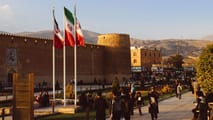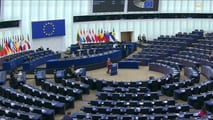U.S. fights Islamic anti-defamation push - ECLJ Mention
Washington Times - Betsy Pisik
UNITED NATIONS | The Bush administration, European governments and religious rights organizations are mounting a new effort to defeat a General Assembly resolution that demands respect for Islam and other religions but has been used to justify persecution of religious minorities.
The resolution, called "Combating Defamation of Religion," is sponsored by the 57-nation Organization of the Islamic Conference (OIC) and has been approved by the world body annually since 2005. It comes up for renewal this fall.
U.S. officials said they hope to persuade moderate Muslim nations - among them Senegal, Mali, Nigeria and Indonesia - to reject the measure, which lacks the force of law but has provided diplomatic cover for regimes that repress critical speech. The officials spoke on the condition of anonymity because of the sensitivity of the topic.
Religious rights groups say other U.N. measures, including statements by the Human Rights Council in Geneva, replicate the language of the resolution.
"Before, it was one resolution with no impact and no implementation," said Felice Gaer, chairman of the U.S. Commission on International Religious Freedom, a bipartisan federal body that investigates abuses and proposes policies to advance "freedom of thought, conscience and religion."
"Now we are seeing a clear attempt by OIC countries to mainstream the concept and insert it into just about every other topic they can," Miss Gaer said. "They are turning freedom of expression into restriction of expression."
European governments are also concerned.
The European Center for Law and Justice filed a brief with the U.N. High Commissioner for Human Rights in June warning that such anti-defamation resolutions "are in direct violation of international law concerning the rights to freedom of religion and expression."
U.S. officials working on human rights said the resolutions are being used to justify harsh blasphemy laws in countries such as Pakistan, Egypt, Sudan and Afghanistan.
The OIC said most of the language in the Combating Defamation of Religion resolution has been used in conventions on cultural and civil rights, the Universal Declaration of Human Rights, and resolutions to combat racism.
The densely worded document is meant to safeguard religious ideas and allow religious minorities to lead "a life of respect ... free of coercion, fear or threat," the OIC office in Geneva told The Washington Times in an e-mail. The office noted that U.N. human rights rapporteurs have been reporting an increase in the number and intensity of "racio-religious" discrimination.
Incidents cited include remarks last year about Islam by Pope Benedict XVI, the publication of cartoons in Danish newspapers that contained unflattering images of the prophet Muhammad and religious rulings issued against iconoclastic Muslim writers such as Ayaan Hirsi Ali and Salman Rushdie.
The most recent version of the anti-defamation resolution, passed by the world body in December, cites the erroneous connection of Islam to terrorism and "stresses the need to effectively combat defamation of all religions and incitement to religious hatred, against Islam and Muslims in particular."
The text also takes aim at the USA Patriot Act, expressing alarm at unnamed laws that "specifically discriminate against and target Muslims ... following the events of 11 September 2001."
The Bush administration and European governments warn that the resolution - which specifically mentions Islam but no other religions - is an Orwellian text that has been used to shut down free speech.
The resolution "replaces the existing objective criterion of limitations on speech where there is an intent to incite hatred or violence against religious believers with a subjective criterion that considers whether the religion or its believers feel offended by the speech," said the brief by the European Center for Law and Justice.
"In cases we've monitored, it's minority religions - Christians, Baha'i, and non-conforming Muslims" - who are most at risk, Miss Gaer said. "People who want to interpret their religion differently than some of the more orthodox clerics would."
"This [language] destabilizes the whole human rights system," said Angela Wu, international law director for the Becket Fund for Religious Liberty, a public interest law firm in Washington. "It empowers the state rather than individual, and protects ideas rather than the person who holds them."
Stephen Suleyman Schwartz, executive director of the Center for Islamic Pluralism, criticized the resolutions but dismissed concerns that they will pave the way for more blasphemy laws.
"The right to criticize a religion is a fundamental right" that is even mentioned in the Koran, he said recently. "In my view, the OIC is moving in a liberal and reformist direction" closer to European hate speech laws than extremist blasphemy laws.
The OIC leadership has been meeting with European and other Western diplomats to try to resolve the issue, said Abdul Wahab, the OIC ambassador to the United Nations in New York.
"We want to build consensus for this resolution, because it will benefit all, and it is important," Mr. Wahab told The Times. "But of course we can have a vote, if necessary."








